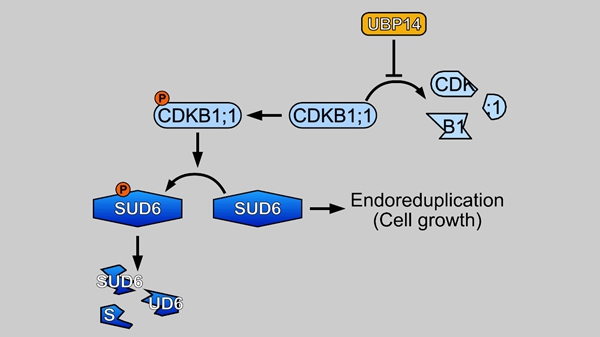Endoreduplication is an alternative version of the classical cell cycle during which cells replicate their nuclear DNA without subsequently dividing, thereby increasing their ploidy level. This process occurs in a variety of cell types and contributes to the normal growth and development of plants. However, the underlying mechanism for endoreduplication remained unclear.
Recently a joint research team revealed the UBP14/DA3-CDKB1;1-CDKG2/SUD6 regulatory module controls endoreduplication and cell growth in Arabidopsis. Researchers led by Prof. LI Yunhai at the Institute of Genetics and Developmental Biology of the Chinese Academy of Sciences, Profs. SONG Chunpeng and GUO Siyi at the Henan University, Prof. QIAN Wei at the Institute of Microbiology of the Chinese Academy of Sciences are involved in the study.
A model for UBP14-CDKB1;1-SUD6 cascade-mediated control of endoreduplication and cell growth in Arabidopsis. (Image by IGDB)
UBIQUITIN-SPECIFIC PROTEASE 14 (UBP14) encoded by DA3 was previously reported to influence the abundance of CDKB1;1 and CYCA2;3 to regulate endoreduplication and cell growth in Arabidopsis.
The da3-1 mutant produces large cotyledons and flowers with increased cell size and endoreduplication. In a genetic screen, the researchers discovered that the suppressor of da3-1 6 (sud6) mutation partially suppressed the da3-1 phenotype. SUD6 encodes cyclin-dependent kinase G2 (CDKG2). Genetic analyses support that UBP14/DA3, CDKB1;1 and CDKG2/SUD6 function in a common pathway to control endoreduplication and cell growth. Further results show that CDKB1;1 interacts with and phosphorylates CDKG2/SUD6, thereby resulting in the reduced abundance of CDKG2/SUD6.
In conclusion, this work demonstrated the involvement of CDKG2 in endoreduplication and cell growth in Arabidopsis.
Their findings established a regulatory cascade for UBP14/DA3-CDKB1;1-CDKG2/SUD6-mediated control of endoreduplication and cell growth in Arabidopsis.
The work, entitled "The UBP14-CDKB1;1-CDKG2 cascade controls endoreduplication and cell growth in Arabidopsis" was published in The Plant Cell on January 17, 2022.
It was funded by the National Natural Science Foundation of China and the Strategic Priority Research Program of Chinese Academy of Sciences.
Contact:
Dr. LI Yunhai
Institute of Genetics and Developmental Biology of the Chinese Academy of Sciences
Email: yhli@genetics.ac.cn
 A model for UBP14-CDKB1;1-SUD6 cascade-mediated control of endoreduplication and cell growth in Arabidopsis. (Image by IGDB)UBIQUITIN-SPECIFIC PROTEASE 14 (UBP14) encoded by DA3 was previously reported to influence the abundance of CDKB1;1 and CYCA2;3 to regulate endoreduplication and cell growth in Arabidopsis.The da3-1 mutant produces large cotyledons and flowers with increased cell size and endoreduplication. In a genetic screen, the researchers discovered that the suppressor of da3-1 6 (sud6) mutation partially suppressed the da3-1 phenotype. SUD6 encodes cyclin-dependent kinase G2 (CDKG2). Genetic analyses support that UBP14/DA3, CDKB1;1 and CDKG2/SUD6 function in a common pathway to control endoreduplication and cell growth. Further results show that CDKB1;1 interacts with and phosphorylates CDKG2/SUD6, thereby resulting in the reduced abundance of CDKG2/SUD6.In conclusion, this work demonstrated the involvement of CDKG2 in endoreduplication and cell growth in Arabidopsis.Their findings established a regulatory cascade for UBP14/DA3-CDKB1;1-CDKG2/SUD6-mediated control of endoreduplication and cell growth in Arabidopsis.The work, entitled "The UBP14-CDKB1;1-CDKG2 cascade controls endoreduplication and cell growth in Arabidopsis" was published in The Plant Cell on January 17, 2022.It was funded by the National Natural Science Foundation of China and the Strategic Priority Research Program of Chinese Academy of Sciences.Contact:Dr. LI YunhaiInstitute of Genetics and Developmental Biology of the Chinese Academy of SciencesEmail: yhli@genetics.ac.cn
A model for UBP14-CDKB1;1-SUD6 cascade-mediated control of endoreduplication and cell growth in Arabidopsis. (Image by IGDB)UBIQUITIN-SPECIFIC PROTEASE 14 (UBP14) encoded by DA3 was previously reported to influence the abundance of CDKB1;1 and CYCA2;3 to regulate endoreduplication and cell growth in Arabidopsis.The da3-1 mutant produces large cotyledons and flowers with increased cell size and endoreduplication. In a genetic screen, the researchers discovered that the suppressor of da3-1 6 (sud6) mutation partially suppressed the da3-1 phenotype. SUD6 encodes cyclin-dependent kinase G2 (CDKG2). Genetic analyses support that UBP14/DA3, CDKB1;1 and CDKG2/SUD6 function in a common pathway to control endoreduplication and cell growth. Further results show that CDKB1;1 interacts with and phosphorylates CDKG2/SUD6, thereby resulting in the reduced abundance of CDKG2/SUD6.In conclusion, this work demonstrated the involvement of CDKG2 in endoreduplication and cell growth in Arabidopsis.Their findings established a regulatory cascade for UBP14/DA3-CDKB1;1-CDKG2/SUD6-mediated control of endoreduplication and cell growth in Arabidopsis.The work, entitled "The UBP14-CDKB1;1-CDKG2 cascade controls endoreduplication and cell growth in Arabidopsis" was published in The Plant Cell on January 17, 2022.It was funded by the National Natural Science Foundation of China and the Strategic Priority Research Program of Chinese Academy of Sciences.Contact:Dr. LI YunhaiInstitute of Genetics and Developmental Biology of the Chinese Academy of SciencesEmail: yhli@genetics.ac.cn CAS
CAS
 中文
中文




.png)
